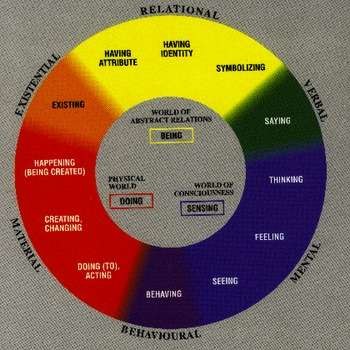-
 BC
14.2kIn this sentence "realize" is an action / transitive verb: "I realized I hate coconut." "I hate coconut" is the insight created by realized, and is the direct object of the transitive verb. "By selling these bonds I will realize a profit." Same here, will realize is a transitive verb, profit is the direct object.
BC
14.2kIn this sentence "realize" is an action / transitive verb: "I realized I hate coconut." "I hate coconut" is the insight created by realized, and is the direct object of the transitive verb. "By selling these bonds I will realize a profit." Same here, will realize is a transitive verb, profit is the direct object.
Does that seem not-right to you? -
 JJJJS
197It's technically a transitive verb there, but what I don't understand is the fact it's also classed as an action verb. There's no action happening there in terms of tangible reality
JJJJS
197It's technically a transitive verb there, but what I don't understand is the fact it's also classed as an action verb. There's no action happening there in terms of tangible reality -
 andrewk
2.1kUnrealised gains on an asset are 'realised' when the asset is sold. This reflects that the gains are made 'real' in the sense that they will for the first time (unless the asset was held in the accounts at fair value) be incorporated in the balance sheet and profit and loss statement.
andrewk
2.1kUnrealised gains on an asset are 'realised' when the asset is sold. This reflects that the gains are made 'real' in the sense that they will for the first time (unless the asset was held in the accounts at fair value) be incorporated in the balance sheet and profit and loss statement. -
 Baden
16.7k@JJJJS
Baden
16.7k@JJJJS
Traditional grammar doesn't deal very well with this and stuffs 'to realize' in as a 'state' or 'stative' verb along with 'to be' etc. There's supposed to be a grammatical commonality in terms of the non-use of the present continuous among state verbs, but there are loads of exceptions to that and in terms of the complement, realize takes an object either usually in the form of a clause (Bitter's 1st example) or a simple direct object (2nd example). Verbs like "to be" and "to have", truer state verbs, don't. It's a bit of mess, basically.
So, I recommend looking at a functional grammar (see diagram below) to get this type of thing clear in your mind. It's in general a much better tool for understanding how the specific language you're looking at works than classical grammar is as the latter is stuffed with illogical rules, some of which are borrowed from other languages (Latin, for example, in the case of English).
Anyhow, "realize" does represent a kind of state, a psychological (but not a relational) one, in the first example, the state of realizing something. So, it appears somewhere between pure relations and pure actions. The diagram below helps visualize the gradual transformation. Verbs like "to be" and "to have" are true state (or relational) verbs—they describe the subject either in terms of identification (e.g. "I am an animal trainer") or attribution (e.g. "I am scared" (intensive)), (I have a knife (possessive)), (I am in the cage (circumstantial)). Verbs like "to do", "to put" etc., on the other hand, are pure actions. Verbs like realize then in the first sense describe conscious thoughts, feelings and senses and behave in the grammar somewhere between pure "state" and pure "action" verbs hence why it's confusing to think of them as either and why they don't behave grammatically as either. (Though realize in the second sense of "made something happen" is, of course, much closer to a pure action verb).

(BTW The "Existential" category refers to phrases like "There is a problem", "There seems to be a hurricane coming" etc...) -
 BC
14.2kBill Clinton said, "It depends upon what the meaning of the word 'is' is." referencing his affair with Monica Lewinsky, an intern who made it big.
BC
14.2kBill Clinton said, "It depends upon what the meaning of the word 'is' is." referencing his affair with Monica Lewinsky, an intern who made it big.
So, a single noun a sentence doesn't make, but can, none the less, convey all sorts of meaning, as "Bitcoin." does here.
Welcome to The Philosophy Forum!
Get involved in philosophical discussions about knowledge, truth, language, consciousness, science, politics, religion, logic and mathematics, art, history, and lots more. No ads, no clutter, and very little agreement — just fascinating conversations.
Categories
- Guest category
- Phil. Writing Challenge - June 2025
- The Lounge
- General Philosophy
- Metaphysics & Epistemology
- Philosophy of Mind
- Ethics
- Political Philosophy
- Philosophy of Art
- Logic & Philosophy of Mathematics
- Philosophy of Religion
- Philosophy of Science
- Philosophy of Language
- Interesting Stuff
- Politics and Current Affairs
- Humanities and Social Sciences
- Science and Technology
- Non-English Discussion
- German Discussion
- Spanish Discussion
- Learning Centre
- Resources
- Books and Papers
- Reading groups
- Questions
- Guest Speakers
- David Pearce
- Massimo Pigliucci
- Debates
- Debate Proposals
- Debate Discussion
- Feedback
- Article submissions
- About TPF
- Help
More Discussions
- If dark matter is displaced by visible matter then is its state of displacement curved spacetime?
- Looking for a native English proofreader in philosophy of science - co-authorship or payment
- Refugees, the Islamic State, and Leaving the Politics of the Enlightenment Era
- Can anyone speak any languages other than English/What are the best ways to learn a second language?
- Other sites we like
- Social media
- Terms of Service
- Sign In
- Created with PlushForums
- © 2026 The Philosophy Forum





